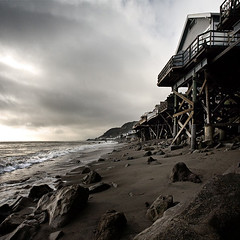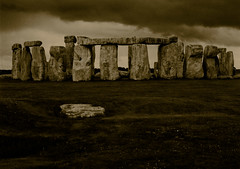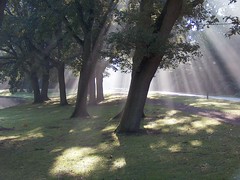WTC7 seems to be a classic controlled demolition. WTC 1 &2 destruction appears to have been enhanced by thermate (a variation of thermite) in addition. Pentagon was not struck by a passenger aircraft. It was a drone or missle.
Sunday, January 01, 2006
Advice to Non-Muslim Women against Marrying Muslim Men
History News Network
Blogger Thoughts: As I have blogged before, I have little support of Daniel Pipes writing in general. In addition I am suspicious of those who portray a clash of cultures as being an overarching dynamic in our world. However, it's possible that the reality of women's subjugation within Islamic culture is undeniably massive.
Blogger Thoughts: As I have blogged before, I have little support of Daniel Pipes writing in general. In addition I am suspicious of those who portray a clash of cultures as being an overarching dynamic in our world. However, it's possible that the reality of women's subjugation within Islamic culture is undeniably massive.
Behind the Eavesdropping Story, a Loud Silence - New York Times
Behind the Eavesdropping Story, a Loud Silence - New York Times
January 1, 2006
The Public Editor
Behind the Eavesdropping Story, a Loud Silence
By BYRON CALAME
THE New York Times's explanation of its decision to report, after what it said was a one-year delay, that the National Security Agency is eavesdropping domestically without court-approved warrants was woefully inadequate. And I have had unusual difficulty getting a better explanation for readers, despite the paper's repeated pledges of greater transparency.
For the first time since I became public editor, the executive editor and the publisher have declined to respond to my requests for information about news-related decision-making. My queries concerned the timing of the exclusive Dec. 16 article about President Bush's secret decision in the months after 9/11 to authorize the warrantless eavesdropping on Americans in the United States.
I e-mailed a list of 28 questions to Bill Keller, the executive editor, on Dec. 19, three days after the article appeared. He promptly declined to respond to them. I then sent the same questions to Arthur Sulzberger Jr., the publisher, who also declined to respond. They held out no hope for a fuller explanation in the future.
Despite this stonewalling, my objectives today are to assess the flawed handling of the original explanation of the article's path into print, and to offer a few thoughts on some factors that could have affected the timing of the article. My intention is to do so with special care, because my 40-plus years of newspapering leave me keenly aware that some of the toughest calls an editor can face are involved here - those related to intelligence gathering, election-time investigative articles and protection of sources. On these matters, reasonable disagreements can abound inside the newsroom.
(A word about my reporting for this column: With the top Times people involved in the final decisions refusing to talk and urging everyone else to remain silent, it seemed clear to me that chasing various editors and reporters probably would yield mostly anonymous comments that the ultimate decision-makers would not confirm or deny. So I decided not to pursue those who were not involved in the final decision to publish the article - or to refer to Times insiders quoted anonymously in others' reporting.)
At the outset, it's essential to acknowledge the far-reaching importance of the eavesdropping article's content to Times readers and to the rest of the nation. Whatever its path to publication, Mr. Sulzberger and Mr. Keller deserve credit for its eventual appearance in the face of strong White House pressure to kill it. And the basic accuracy of the account of the eavesdropping stands unchallenged - a testament to the talent in the trenches.
But the explanation of the timing and editing of the front-page article by James Risen and Eric Lichtblau caused major concern for scores of Times readers. The terse one-paragraph explanation noted that the White House had asked for the article to be killed. "After meeting with senior administration officials to hear their concerns, the newspaper delayed publication for a year to conduct additional reporting," it said. "Some information that administration officials argued could be useful to terrorists has been omitted."
If Times editors hoped the brief mention of the one-year delay and the omitted sensitive information would assure readers that great caution had been exercised in publishing the article, I think they miscalculated. The mention of a one-year delay, almost in passing, cried out for a fuller explanation. And the gaps left by the explanation hardly matched the paper's recent bold commitments to readers to explain how news decisions are made.
At the very least, The Times should have told readers in the article why it could not address specific issues. At least some realization of this kicked in rather quickly after publication. When queried by reporters for other news media on Dec. 16, Mr. Keller offered two prepared statements that shed some additional light on the timing and handling of the article.
The longer of Mr. Keller's two prepared statements said the paper initially held the story based on national security considerations and assurances that everyone in government believed the expanded eavesdropping was legal. But when further reporting showed that legal questions loomed larger than The Times first thought and that a story could be written without certain genuinely sensitive technical details, he said, the paper decided to publish. (Mr. Keller's two prepared statements, as well as some thoughtful reader comments, are posted on the Public Editor's Web Journal.)
Times readers would have benefited if the explanation in the original article had simply been expanded to include the points Mr. Keller made after publication. And if the length of that proved too clunky for inclusion in the article, the explanation could have been published as a separate article near the main one. Even the sentence he provided me as to why he would not answer my questions offered some possible insight.
Protection of sources is the most plausible reason I've been able to identify for The Times's woeful explanation in the article and for the silence of Mr. Sulzberger and Mr. Keller. I base this on Mr. Keller's response to me: "There is really no way to have a full discussion of the back story without talking about when and how we knew what we knew, and we can't do that."
Taken at face value, Mr. Keller seems to be contending that the sourcing for the eavesdropping article is so intertwined with the decisions about when and what to publish that a full explanation could risk revealing the sources. I have no trouble accepting the importance of confidential sourcing concerns here. The reporters' nearly one dozen confidential sources enabled them to produce a powerful article that I think served the public interest.
With confidential sourcing under attack and the reporters digging in the backyards of both intelligence and politics, The Times needs to guard the sources for the eavesdropping article with extra special care. Telling readers the time that the reporters got one specific fact, for instance, could turn out to be a dangling thread of information that the White House or the Justice Department could tug at until it leads them to the source. Indeed, word came Friday that the Justice Department has opened an investigation into the disclosure of classified information about the eavesdropping.
The most obvious and troublesome omission in the explanation was the failure to address whether The Times knew about the eavesdropping operation before the Nov. 2, 2004, presidential election. That point was hard to ignore when the explanation in the article referred rather vaguely to having "delayed publication for a year." To me, this language means the article was fully confirmed and ready to publish a year ago - after perhaps weeks of reporting on the initial tip - and then was delayed.
Mr. Keller dealt directly with the timing of the initial tip in his later statements. The eavesdropping information "first became known to Times reporters" a year ago, he said. These two different descriptions of the article's status in the general vicinity of Election Day last year leave me puzzled.
For me, however, the most obvious question is still this: If no one at The Times was aware of the eavesdropping prior to the election, why wouldn't the paper have been eager to make that clear to readers in the original explanation and avoid that politically charged issue? The paper's silence leaves me with uncomfortable doubts.
On the larger question of why the eavesdropping article finally appeared when it did, a couple of possibilities intrigue me.
One is that Times editors said they discovered there was more concern inside the government about the eavesdropping than they had initially been told. Mr. Keller's prepared statements said that "a year ago," officials "assured senior editors of The Times that a variety of legal checks had been imposed that satisfied everyone involved that the program raised no legal questions." So the paper "agreed not to publish at that time" and continued reporting.
But in the months that followed, Mr. Keller said, "we developed a fuller picture of the concerns and misgivings that had been expressed during the life of the program" and "it became clear those questions loomed larger within the government than we had previously understood."
The impact of a new book about intelligence by Mr. Risen on the timing of the article is difficult to gauge. The book, "State of War: The Secret History of the CIA and the Bush Administration," was not mentioned in the Dec. 16 article. Mr. Keller asserted in the shorter of his two statements that the article wasn't timed to the forthcoming book, and that "its origins and publication are completely independent of Jim's book."
The publication of Mr. Risen's book, with its discussion of the eavesdropping operation, was scheduled for mid-January - but has now been moved up to Tuesday. Despite Mr. Keller's distancing of The Times from "State of War," Mr. Risen's publisher told me on Dec. 21 that the paper's Washington bureau chief had talked to her twice in the previous 30 days about the book.
So it seems to me the paper was quite aware that it faced the possibility of being scooped by its own reporter's book in about four weeks. But the key question remains: To what extent did the book cause top editors to shrug off the concerns that had kept them from publishing the eavesdropping article for months?
A final note: If Mr. Risen's book or anything else of substance should open any cracks in the stone wall surrounding the handling of the eavesdropping article, I will have my list of 28 questions (35 now, actually) ready to e-mail again to Mr. Keller.
The public editor serves as the readers' representative. His opinions and conclusions are his own. His column appears at least twice monthly in this section.
January 1, 2006
The Public Editor
Behind the Eavesdropping Story, a Loud Silence
By BYRON CALAME
THE New York Times's explanation of its decision to report, after what it said was a one-year delay, that the National Security Agency is eavesdropping domestically without court-approved warrants was woefully inadequate. And I have had unusual difficulty getting a better explanation for readers, despite the paper's repeated pledges of greater transparency.
For the first time since I became public editor, the executive editor and the publisher have declined to respond to my requests for information about news-related decision-making. My queries concerned the timing of the exclusive Dec. 16 article about President Bush's secret decision in the months after 9/11 to authorize the warrantless eavesdropping on Americans in the United States.
I e-mailed a list of 28 questions to Bill Keller, the executive editor, on Dec. 19, three days after the article appeared. He promptly declined to respond to them. I then sent the same questions to Arthur Sulzberger Jr., the publisher, who also declined to respond. They held out no hope for a fuller explanation in the future.
Despite this stonewalling, my objectives today are to assess the flawed handling of the original explanation of the article's path into print, and to offer a few thoughts on some factors that could have affected the timing of the article. My intention is to do so with special care, because my 40-plus years of newspapering leave me keenly aware that some of the toughest calls an editor can face are involved here - those related to intelligence gathering, election-time investigative articles and protection of sources. On these matters, reasonable disagreements can abound inside the newsroom.
(A word about my reporting for this column: With the top Times people involved in the final decisions refusing to talk and urging everyone else to remain silent, it seemed clear to me that chasing various editors and reporters probably would yield mostly anonymous comments that the ultimate decision-makers would not confirm or deny. So I decided not to pursue those who were not involved in the final decision to publish the article - or to refer to Times insiders quoted anonymously in others' reporting.)
At the outset, it's essential to acknowledge the far-reaching importance of the eavesdropping article's content to Times readers and to the rest of the nation. Whatever its path to publication, Mr. Sulzberger and Mr. Keller deserve credit for its eventual appearance in the face of strong White House pressure to kill it. And the basic accuracy of the account of the eavesdropping stands unchallenged - a testament to the talent in the trenches.
But the explanation of the timing and editing of the front-page article by James Risen and Eric Lichtblau caused major concern for scores of Times readers. The terse one-paragraph explanation noted that the White House had asked for the article to be killed. "After meeting with senior administration officials to hear their concerns, the newspaper delayed publication for a year to conduct additional reporting," it said. "Some information that administration officials argued could be useful to terrorists has been omitted."
If Times editors hoped the brief mention of the one-year delay and the omitted sensitive information would assure readers that great caution had been exercised in publishing the article, I think they miscalculated. The mention of a one-year delay, almost in passing, cried out for a fuller explanation. And the gaps left by the explanation hardly matched the paper's recent bold commitments to readers to explain how news decisions are made.
At the very least, The Times should have told readers in the article why it could not address specific issues. At least some realization of this kicked in rather quickly after publication. When queried by reporters for other news media on Dec. 16, Mr. Keller offered two prepared statements that shed some additional light on the timing and handling of the article.
The longer of Mr. Keller's two prepared statements said the paper initially held the story based on national security considerations and assurances that everyone in government believed the expanded eavesdropping was legal. But when further reporting showed that legal questions loomed larger than The Times first thought and that a story could be written without certain genuinely sensitive technical details, he said, the paper decided to publish. (Mr. Keller's two prepared statements, as well as some thoughtful reader comments, are posted on the Public Editor's Web Journal.)
Times readers would have benefited if the explanation in the original article had simply been expanded to include the points Mr. Keller made after publication. And if the length of that proved too clunky for inclusion in the article, the explanation could have been published as a separate article near the main one. Even the sentence he provided me as to why he would not answer my questions offered some possible insight.
Protection of sources is the most plausible reason I've been able to identify for The Times's woeful explanation in the article and for the silence of Mr. Sulzberger and Mr. Keller. I base this on Mr. Keller's response to me: "There is really no way to have a full discussion of the back story without talking about when and how we knew what we knew, and we can't do that."
Taken at face value, Mr. Keller seems to be contending that the sourcing for the eavesdropping article is so intertwined with the decisions about when and what to publish that a full explanation could risk revealing the sources. I have no trouble accepting the importance of confidential sourcing concerns here. The reporters' nearly one dozen confidential sources enabled them to produce a powerful article that I think served the public interest.
With confidential sourcing under attack and the reporters digging in the backyards of both intelligence and politics, The Times needs to guard the sources for the eavesdropping article with extra special care. Telling readers the time that the reporters got one specific fact, for instance, could turn out to be a dangling thread of information that the White House or the Justice Department could tug at until it leads them to the source. Indeed, word came Friday that the Justice Department has opened an investigation into the disclosure of classified information about the eavesdropping.
The most obvious and troublesome omission in the explanation was the failure to address whether The Times knew about the eavesdropping operation before the Nov. 2, 2004, presidential election. That point was hard to ignore when the explanation in the article referred rather vaguely to having "delayed publication for a year." To me, this language means the article was fully confirmed and ready to publish a year ago - after perhaps weeks of reporting on the initial tip - and then was delayed.
Mr. Keller dealt directly with the timing of the initial tip in his later statements. The eavesdropping information "first became known to Times reporters" a year ago, he said. These two different descriptions of the article's status in the general vicinity of Election Day last year leave me puzzled.
For me, however, the most obvious question is still this: If no one at The Times was aware of the eavesdropping prior to the election, why wouldn't the paper have been eager to make that clear to readers in the original explanation and avoid that politically charged issue? The paper's silence leaves me with uncomfortable doubts.
On the larger question of why the eavesdropping article finally appeared when it did, a couple of possibilities intrigue me.
One is that Times editors said they discovered there was more concern inside the government about the eavesdropping than they had initially been told. Mr. Keller's prepared statements said that "a year ago," officials "assured senior editors of The Times that a variety of legal checks had been imposed that satisfied everyone involved that the program raised no legal questions." So the paper "agreed not to publish at that time" and continued reporting.
But in the months that followed, Mr. Keller said, "we developed a fuller picture of the concerns and misgivings that had been expressed during the life of the program" and "it became clear those questions loomed larger within the government than we had previously understood."
The impact of a new book about intelligence by Mr. Risen on the timing of the article is difficult to gauge. The book, "State of War: The Secret History of the CIA and the Bush Administration," was not mentioned in the Dec. 16 article. Mr. Keller asserted in the shorter of his two statements that the article wasn't timed to the forthcoming book, and that "its origins and publication are completely independent of Jim's book."
The publication of Mr. Risen's book, with its discussion of the eavesdropping operation, was scheduled for mid-January - but has now been moved up to Tuesday. Despite Mr. Keller's distancing of The Times from "State of War," Mr. Risen's publisher told me on Dec. 21 that the paper's Washington bureau chief had talked to her twice in the previous 30 days about the book.
So it seems to me the paper was quite aware that it faced the possibility of being scooped by its own reporter's book in about four weeks. But the key question remains: To what extent did the book cause top editors to shrug off the concerns that had kept them from publishing the eavesdropping article for months?
A final note: If Mr. Risen's book or anything else of substance should open any cracks in the stone wall surrounding the handling of the eavesdropping article, I will have my list of 28 questions (35 now, actually) ready to e-mail again to Mr. Keller.
The public editor serves as the readers' representative. His opinions and conclusions are his own. His column appears at least twice monthly in this section.
RAND | Newsroom | Commentary | War, Propaganda and Public Opinion
RAND | Newsroom | Commentary | War, Propaganda and Public Opinion
Blogger Thougths: Rand BS: Move along, nothing to see here. Just doing what we've always done, like in the that Great Honorable War.
Blogger Thougths: Rand BS: Move along, nothing to see here. Just doing what we've always done, like in the that Great Honorable War.
RAND | Newsroom | Commentary | Biometrics in the War on Terror
RAND | Newsroom | Commentary | Biometrics in the War on Terror
Blogger Thoughts: Rand BS Commentary says: We're winning because of our great biometrics capabilities.
Blogger Thoughts: Rand BS Commentary says: We're winning because of our great biometrics capabilities.
Subscribe to:
Comments (Atom)




